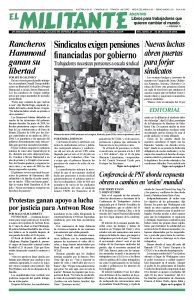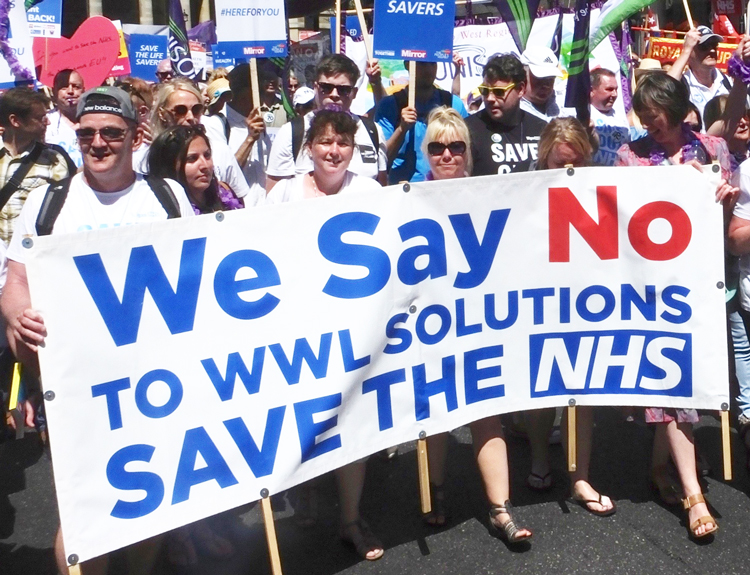WIGAN, England — “We’re so proud, everyone’s walking around work with massive smiles, because we’ve won,” hospital porter Stuart Horrigan told the Militant after members of the Unite and UNISON unions gained an important victory here.
In face of escalating strike action and broadening solidarity, National Health Service bosses backed off July 6 from moves to transfer workers from the state-run NHS to a new private company. This would have paved the way for an assault on workers’ wages and job conditions, as well as health care.
Hospital bosses had previously met June 27 and set August 1 for transferring almost 900 domestics, porters, caterers and other workers in the estates and facilities department to a private company set up and owned by the NHS hospital trust, called WWL Solutions.
In response, workers organized a five-day strike June 28-July 2, determined to defend their wages, conditions and dignity. They had previously walked out twice for two days each. They report union membership has doubled — from 300 to 600 — in the course of the dispute and hundreds joined the stoppages, including a number of nonunion workers, as well as the picket lines. To broaden support, strikers organized two marches into the center of Wigan and other public activities. A further seven-day strike was planned to start July 17.
Attacks on hospital workers and health care like the one NHS bosses tried in Wigan are a growing crisis for working people across Britain. More than 10,000 workers in 19 different NHS trusts have been transferred to similar private setups, laying the basis for widening differentials in wages and conditions.
Workers and their union representatives had packed the June 27 board meeting and walked out, shouting “Shame!” following the decision to go ahead with the transfer.
“It was a slap in our face,” Tina Fox, a striking domestic worker and UNISON member, told the Militant at the picket line June 28. “All they think about is profits, we think about the NHS, that is why we keep fighting. They think we’re weak and try to divide us, but standing up together has made us stronger!”
On June 30 a busload of strikers, their relatives and supporters joined a march of thousands in London, marking the 70th anniversary of the National Health Service, to reach out for solidarity.
“I really enjoyed the march, the atmosphere was fantastic,” said Natasha Wilson, one of the strikers. She was part of a group who did a bucket collection during the march to get donations to the strike fund. “The money was coming in so fast!” she said. “Many already knew about the strike from television and newspapers.” Over £1,000 was collected ($1,300).
At the start of the march, Pete Clifford, a meat worker and member of the Community union at Tulip meats, delivered a solidarity card signed by 35 workers from the plant in Dukinfield near Manchester.
The hospital bosses “have used social media, any sort of media to tell a pack of lies, which they hope the public will believe,” striker Joanne McClure told the rally held before the march. “But the important thing people need to remember is how strong we are, how firm we stand together even when we have abuse thrown at us. We speak the truth.”
Frances O’Grady, general secretary of the Trades Union Congress, marched alongside the contingent of Wigan NHS workers, as did Dave Prentis, general secretary of UNISON.
This fight took place amid a deepening crisis of health care in the United Kingdom. Billions of pounds have been cut from the NHS to make “efficiency savings” and projected reductions in health expenditure, both per person and as a percentage of the gross domestic product.


